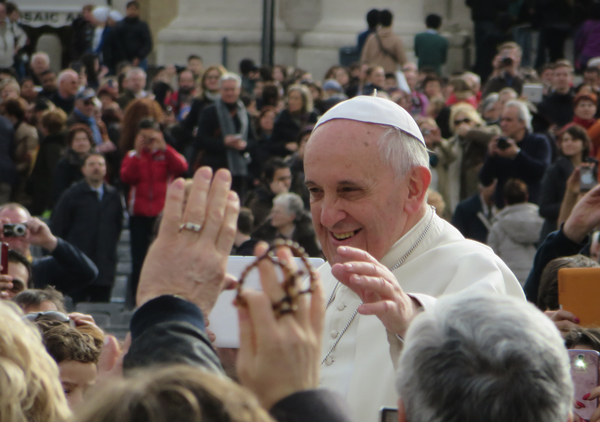(RNS) Did Pope Francis tell a divorced and remarried woman that it was okay to take Communion even though her parish priest denied her the host?

Pope Francis greets a crowd on his way to a meeting with cardinals at the Vatican on Feb. 21, 2014. RNS photo by David Gibson
That’s the latest kerfuffle created by the “cold-call” pope who on Monday, the day after Easter, called an Argentine woman who had written to him about whether she should receive communion at Mass even though she was divorced and remarried.
“There are priests who are more papist than the pope,” the pope himself reportedly told Jacquelina Lisbona.
Great line, great story — but is any of it true? The details have been shifting.
The story first ran in Argentine media, was picked up by Italian outlets, made its way to the British press, and in the course of those peregrinations lost — and gained — a few details in the process.
This is potentially a big deal, as Damian Thompson of the Daily Telegraph put it, because Catholics who have divorced and remarried without an annulment are not supposed to take Communion — though Francis himself has asked the hierarchy to debate the topic, which they are, quite intensely.
“Has Pope Francis just thrown a hand grenade into traditional teaching on divorcees and Communion?” Thompson tweeted. “The Vatican MUST clarify this or the Catholic world will divide into celebration and panic.”
Kudos to CNN, which UPDATES the story with reporting from three continents (literally): CNN has a Vatican spokesman confirming that the call did indeed take place, but the Rev. Thomas Rosica provided no details.
“It’s between the Pope and the woman,” said Rosica, a consultant for the Vatican press office.
“To draw any conclusions about this particular situation, that the Pope may be setting an agenda, is incorrect,” Rosica told the network. “The Pope is first and foremost an esteemed pastor, and dealing with a human situation is always complex.”
Then on Thursday, the Vatican’s chief spokesman, the Rev. Federico Lombardi, issued a statement that also confirmed the chat but threw cold water on Ms. Lisbona’s recounting of the details, as well as that of her husband:
Several telephone calls have taken place in the context of Pope Francis’ personal pastoral relationships.
Since they do not in any way form part of the Pope’s public activities, no information or comments are to be expected from the Holy See Press Office.
That which has been communicated in relation to this matter, outside the scope of personal relationships, and the consequent media amplification, cannot be confirmed as reliable, and is a source of misunderstanding and confusion.
Therefore, consequences relating to the teaching of the Church are not to be inferred from these occurrences.
That’s good to keep in mind, though this is a big deal in terms of the example Francis is setting rather than the doctrine that he is, in fact, not changing.
So here’s how this all came about:
First off, the initial report came via Telam, the Argentine new agency, and was largely based on a Facebook post by Julio Sabetta, the husband of Jacquelina Lisbona. Those reports said that a “Father Bergoglio” had called Jacquelina on Monday; she had written him last fall to say that her parish priest denied her Communion because she was divorced and remarried.
Second, the report was picked up by the Italian daily La Stampa, which led with the headline: “The Pope told me over the phone that a divorced Catholic can take communion.” Thompson at the Telegraph then picked up the story, also noting that the woman and her husband have been married 19 years and have two children.
Third, Lisbona then spoke to a Buenos Aires radio station and clarified that it was her husband who had been divorced, and that the pair had been married but only civilly, not in the church.
“We used to go to Mass, not every day,” Lisbona told the radio, according to a Vatican Insider translation. “Here at home, we pray every evening, turning to God always; when someone is in a difficult situation God is the first one they turn to. I wrote the letter spontaneously. I wrote to him (Pope Francis) because he’s Argentinean, he listens to people and I believe in miracles.”
Lisbona said she had tried going back to Mass last year but her parish priest told her she could not receive Communion, also that she could not go to confession since she would simply be going back to a sinful situation.
So she wrote to Francis in September, and then on Monday…
“The phone rang and my husband answered. It was Fr. Bergoglio calling. The father asked to speak to me and my husband asked: ‘Who’s calling?’, to which the voice replied ‘Fr. Bergoglio.’ I asked him if it was really him, the pope, and he said it was and that he was calling in response to my letter dated September.”
Lisbona said the pope told her she should go to Communion, though she did not provide many other details. She seems put off by all the fuss.
“This received too much public attention. He told me to go and take Communion in a different parish, but now I won’t be able to go anywhere,” she told the radio. The pope said he was “dealing with the issue” of Communion for divorced and remarried Catholics, and she added:
“Then he told me there are some priests who are more papist that the pope. He was completely normal with me on the phone and I tried to speak to him with the utmost respect. Now I am overwhelmed by the enormous effect this story has had and I feel moved by the fact that I spoke to Francis. I told him I would write to him again when I take Communion again.”
An interesting postscript: Lisbona said the priest who initially told her not to take Communion has left ministry so he can marry. He will, of course, be able to take Communion…
The Upshot (which is the latest cool new thing in journalism, as per the NYT):
Yes, the pope called Jacquelina Lisbona. The real question regards the content of the conversation. If indeed he said those things this would be a big deal because she is still in what the church would call an “irregular” marriage. Her husband is divorced, and they have not been married in the church.
But that’s a big, big “if.”
One caveat: Julio Sabetta’s comments to CNN’s Argentine desk do seem to stretch even Francis’ generous notions of mercy:
“She spoke with the Pope, and he said she was absolved of all sins and she could go and get the Holy Communion because she was not doing anything wrong,” Sabetta told Channel 3 Rosario, a CNN affiliate.
That sounds like a formal absolution, which is unlikely the pontiff gave over the phone — because that’s not how confession works. And pastors in such a situation would be more likely to say that she should go to communion even as they try to regularize her situation by marrying the couple in the church — not that they aren’t doing anything wrong.
In any case, Francis once again has set an example for the rest of the hierarchy even without changing church law, and it’s in keeping with the pope’s character — Francis has frequently shown little patience with priests who are “little monsters” (his words) who cite “small-minded” rules rather than ministering mercy to people.
In fact, while he was archbishop of Buenos Aires he famously rebuked “hypocrite” priests who would not baptize the babies of unwed mothers, and he has baptized the children of parents who were not married in the church.
So stay tuned …





